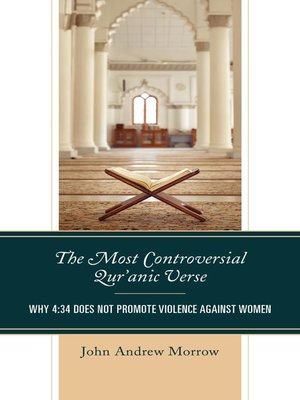The Most Controversial Qur'anic Verse
ebook ∣ Why 4: 34 Does Not Promote Violence Against Women
By John Andrew Morrow

Sign up to save your library
With an OverDrive account, you can save your favorite libraries for at-a-glance information about availability. Find out more about OverDrive accounts.
Find this title in Libby, the library reading app by OverDrive.



Search for a digital library with this title
Title found at these libraries:
| Library Name | Distance |
|---|---|
| Loading... |
A fourteen centuries old consensus by Islamic religious authorities has upheld the belief that God has granted husbands the right to beat their wives. Previously, the only element up for debate was the degree of severity, the instrument of the beating, and the limit to the damage allowed. This startling assertion, which shocks human sensibilities, is confirmed by hundreds of Qur'anic commentaries and works of Islamic jurisprudence authored over the course of the past millennia and a half.
In this pivotal, courageous, and timely analysis, which works diligently and minutely to separate truth from falsehood, right from wrong, the moral from the immoral, and the ethical from the unethical, Dr. John Andrew Morrow provides an exhaustive study of the second part of the Qur'anic text, 4:34, dispelling the belief that Islam allows domestic violence.
Like Titan, who bears the weight of the heavens upon his shoulders, Morrow takes on the entire corpora of Islamic Tradition. Along the way, the author delicately and defiantly dispels misogynistic misinterpretations of the Word of God while slashing and burning the sexist sayings that were attributed to the Prophet Muhammad. In so doing, he may well save Islam from those traditionalists and misogynists who claim to speak in God's name.
In this pivotal, courageous, and timely analysis, which works diligently and minutely to separate truth from falsehood, right from wrong, the moral from the immoral, and the ethical from the unethical, Dr. John Andrew Morrow provides an exhaustive study of the second part of the Qur'anic text, 4:34, dispelling the belief that Islam allows domestic violence.
Like Titan, who bears the weight of the heavens upon his shoulders, Morrow takes on the entire corpora of Islamic Tradition. Along the way, the author delicately and defiantly dispels misogynistic misinterpretations of the Word of God while slashing and burning the sexist sayings that were attributed to the Prophet Muhammad. In so doing, he may well save Islam from those traditionalists and misogynists who claim to speak in God's name.






